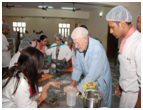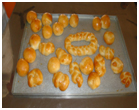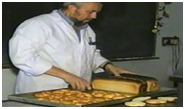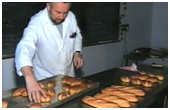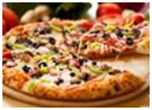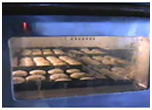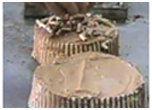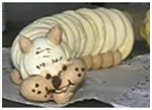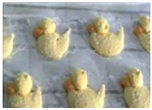Background:
This course shall qualify you for responsible positions in the bakery industry and for research responsibilities in baking and allied industries. The course is offered thrice a year.
IIB graduates after attending this course can perform functions in the under mentioned positions:
- Production management
- Technical sales and services
- Retail baking management
- New business development
- Research and development
- Quality assurance
- Consulting
- Company management
The curriculum focuses on the technology of baking in a production setting. Students through lectures and labs learn the “whys” of baking and “how” the theory of baking is transferred to production.
Training would enable you to:
- Formulate products from scratch
- Develop new bakery products
- Evaluate the quality of baked products
- Establish and monitor ingredient specifications
- Supervise control points in the baking process
- Troubleshoot baking production problems
Classes are divided into small groups and students work individually or in teams to develop production skills.
Subjects taught include:
Baking Science, Bread, Buns and Roll Production, Cookies and cracker production, Cake and Sweet Goods Production, Production Management & Project work, and Food Product Safety.
Training takes place in a first-class environment with modern classroom facilities and labs. Class size is limited to provide personal attention. Excellent private apartments are available for housing in the vicinity and nearby localities.
Placement assistance
IIB helps graduates find a job by:
- Helping write resumes that work
- Posting resumes on IIB’s web site
- Featuring self-sponsored students from each class in Bakery Dunya with photos and biographical information
- Mailing resumes to all industry contacts
Detailed Agenda For 16 weeks: Agenda is Subject to change
Class curriculum
The Baking, Confectionery and Cake Craft 16-week classes consist of under mentioned major areas of study:
1. Bread, Buns and Roll Production.
2. Cookies & Cracker Production.
3. Cake and Sweet Goods Production.
4. Baking Science
5. Production Management
6. Application Projects
Bread, Buns and Roll Production Lectures (230 hours)
You’ll shall learn about type of flours and their role in bread and rolls production. Learn how ingredients interact in the dough and how to manipulate formulas to achieve desired product results. Understanding the “why’s” of ingredient usage is your first step toward understanding troubleshooting and attaining product development skills. You would understand different methods of dough development like:
- straight-dough
- sponge and dough
- liquid ferments
- no-time doughs
- high speed mixing
- continuous mixing
You’ll recognize troubles in production and devise strategies for each system. In the lab you would attempt production of mentioned products:
- Baquettes
- Brioches
- Brown bread
- Cinnamon sugar loaf
- Country style bread
- Croissants
- Crusty rolls and pistolets
- Donuts
- Danish pastry
- Dutch sugar cracknels
- Dutch luxury bread
- Dutch luxury rolls
- Fancy sweet bread
- Fruited bread
- Fruited brown bread
- Hamburger buns
- Party bread
- Sandwich bread
- Soft rolls
- Tiger skin bread
- Toast bread
- Hamburger and hot dog buns
- Brown-and-serve rolls and par-baked products
- Bagels
- Tortillas
- English muffins
- Italian, French, and rye breads
- Raisin and cinnamon breads
- Whole wheat, wheat, and high fiber breads
- Sourdough bread
In “hands-on” labs prepare bread, buns and roll products. Observe the effects of varying flour type; changing the amount of water, salt, and sugars. Make products using dough systems described in lectures. Learn to appreciate not only the science, but also the art, of baking. Following each lab, examine the products and discuss the change in characters by changing the ingredients.
Confectionery Production Lectures & Labs(230 hours)
While in this section, you’ll learn about ingredients, formulations, processing techniques, equipment, and troubleshooting and observe how controlling batter and dough temperatures is linked to controlling production schedules and product quality. Learn about how the ingredients interact, and how to calculate formulas for all types of cakes and sweet goods. The under mentioned products would be attempted:
- Short pastry
- Crumbling dough method
- Short bread biscuit
- Thick round biscuits
- Thick long biscuits
- Varied biscuits
- Butter biscuits
- Coffee biscuits
- Mosaic biscuits
- Creaming dough method
- Fritter
- Long fritter
- Zigzag fritter
- Choux paste
- Banana Choux
- Cream choux
- Chocolate choux
- Tiger choux
- Malakofs
- Eclairs
- Merinque
- Custard
- Butter cream
- Sponge
- Swiss roll
- Coffee cake
- Chocolate cake
- Cream cake
- Fruit cake
- Apple cake
- Coffee cakes
- Cream slab cakes
- Square coffee slab cakes
- Shells
- Flan
- Puff pastry
- Meat pies
- Cream horns
- Vanilla slice
- Apple pies
- Cushions
- Sweet butter flies
- Layer cakes – yellow, white, chocolate, and others
- Angel food cake
- Sponge cake
- Snack cakes
- Chiffon cake
- Pound cake
- Quick breads (banana, pumpkin, etc.)
- Muffins (bran, corn, blueberry, etc.)
- Sweet dough products (cinnamon rolls, coffeecakes, etc.)
- Danish pastries and croissants
- Puff pastry, turnovers
- Fruit pies and cream pies
- Yeast-raised and cake donuts
- Cheesecake
- Art of Cake Decoration
Through hand-on workshops you would learn processing techniques. you learn to recognize sources of trouble during production. The scoring sessions that follow each lab will allow you to confidently identify product faults and learn how to correct them.
Baking Science Lectures & Labs (80 hours)
You will learn the fundamentals of baking science with emphasis on the functional chemistry of baking ingredients. You will come to understand the function of each major ingredient and many minor ingredients. You will know what ingredient you need and where to get them after participating in detailed discussions about major and minor ingredients – their available sources, chemical composition, commercial processing, functionality, and applications in bakery foods. .
Sharpen your “hands-on” quality control and quality assurance skills during labs. Observe and then preform operational and testing procedures using current flour (dough) testing. Gain insight of other analytical testing procedures by watching instructor demonstrations. Study and test the functional characteristics of starch gels, leavening systems, and fats and oils. Gain an ability to make better decisions on ingredient specifications. Also practice art of cake decorating.
Production Management(60 hours)
In today’s very competitive marketplace, you must master the tools of business in addition to baking skills. You must produce a clean, safe, unadulterated product that is cost competitive. To meet this need, the course will expose you to the three areas a supervisor must control – people, equipment, and materials.
You will learn about:
- situational leadership skills
- performance management
- new product development
- verbal and nonverbal communication
- occupational safety for the bakery supervisor
- team building
- conflict resolution
- time management
- nutritional labelling
- cost accounting
- production scheduling
- project management
- statistical process control
- total quality management
- food safety/HACCP
Mathematics(5 hours)
You’ll review and learn to easily apply basic mathematics to solve problems related to:
- baker’s percent (the standard basis for calculating dough ingredient percentages)
- true percent
- ratio and proportion
Application Projects(35 hours)
The class is divided into teams, and each team selects a specific product category. Within each category, each team develops the following information:
- Original product formulation, which is test-baked
- Ingredient specifications
- Ingredient specifications
- HACCP plan (Hazard Analysis and Critical Control Points)
- Equipment selection
- Production line layout
- Cost sheets and financial statements
- Supervisor checklist
The projects are supported by IIB International’s experts, who help students understand pre-requisite programs (good manufacturing practices, sanitation programs, etc.), how to develop a HACCP plan, and how to evaluate quality systems.
Visit of baking industries and one month in-plant training if possible. Project writing and presentations. Submission of project and viva-voce examination.

